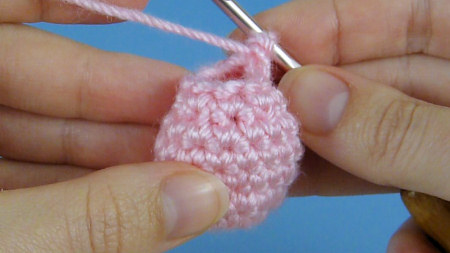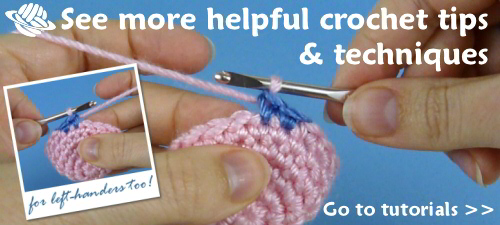After the magic ring, what’s the one other technique you need if you want to create beautifully finished amigurumi? The invisible decrease (abbreviated invdec) – it’s absolutely invaluable. Nobody likes to look at a lumpy bottom, and that’s true even for amigurumi rear ends! The invisible decrease is as good as its name – you’ll have no more bumpy or gappy decreases once you’ve mastered this technique.

In addition to the obvious use in amigurumi, you can also use the invisible decrease for any piece worked in single crochet, in the round, without turning (e.g. hats). As it leaves unworked loops on the back of the piece, you won’t want to use it for anything where you turn between rows/rounds, or where both sides will be on display.
(If you already know how to invdec, you can skip this video, if you like – there’s nothing extra that I didn’t show you in my original invisible decrease photo tutorial – but I’m building my crochet tutorials video library and that has to include the essential basics as well as clever tips and new techniques. My next video will show you a brand new crochet technique I just developed!)
And now to the video tutorial (in right- and left-handed versions, of course):
Invisible Decrease for Amigurumi (right-handed)
Click to watch this video on YouTube.
Invisible Decrease for Amigurumi (left-handed)
Click to watch this video on YouTube.
Note: The videos may look a little small embedded in the blog: if so, you can fullscreen them or click through to YouTube to watch them full-sized 🙂
UPDATE: If your invisible decreases aren’t quite invisible and still look a little gappy, see my follow-up tutorial for tips to perfect your invdec stitches.
If you enjoy my crochet tutorial videos, please help to spread the word about them, and/or subscribe to the PlanetJune YouTube channel.
Loved this tutorial? I have so many more amigurumi tips and tricks to share with you!
Boost your amigurumi skills with my latest book, The Essential Guide to Amigurumi, your comprehensive guide to amigurumi techniques and tips.
Do you find my tutorials helpful? If so, please consider making a contribution towards my time so I can continue to create clear and concise tutorials for you:
Thank you so much for your support! Now click below for loads more crochet video and photo tutorials (and do let me know what else you’d like me to cover in future tutorials…)


















Cherl said
I am an experienced crotcher too, and I really like the inv decrease now. It looks great. You demonstrate it wonderfully.
Dave said
Outstanding find ! I bookmarked it after I read the picture instruction on invdec. Then I checked out the video just for fun and it complements the pictures and really drive the instructions home. Your site is a gold mine for crochet tips. Thanks much,
Dave
Babou said
Tr
June said
Babou, please see the translation information in my FAQ.
Jane Pope said
You are nothing less than a genious. Thank you so much!
Margaret said
Thank you so much for your amazing videos. I have been crocheting for 65 years and have never come across these methods of invisible decrease and joining in the next yarn before. These tips will make such a difference to my amigurumi animals.
MegsMadeIt said
Oh thank you! This just made my day
Jan McCarthy said
Hi June,
Am making the sea turtle, what great and clear instructions.just love the magic ring process.Love the web site, will be buying many more patterns, and learning so much more. Thanks so much Regards Jan McCarthy..Australia.
Davina said
Hi June,
I am an experienced crocheter and have recently discovered your website and absolutely love it. It is so exciting to use your tips and hints and I do wonder how I have been crocheting for years and had to make do without them. Please keep up the good work as I am now an ardent follower even though I am an oldie I love to keep up.
patty said
Love your tutorial also great you have for lefthanders as I’m a lefty
On your video for invisible stitch love the flower with the yellow stem and green base would you have the directions for that if ya do could you email me again great tutorial and you go slow as ya can follow
June said
Patty, I’m not sure which video (or pattern) you’re referring to, but you can find all my plant and flower patterns here, so you should be able to spot the one you were interested in!
Claudia said
Your homepage and all tutorial videos are just amazing. Thanks a lot! I have recently started with amigurumi, that’s my decreases didn’t look very professional. Now I know why… Thanks for all your lovely patterns! It’s wonderful that they look like real animals. Greetings from Mexico, Claudia
Kristina said
What a difference this technique made! I remade a giraffe, using your method. No more stair-case look! I’m so pleased! This was just my second amigurimi, so I have much to learn. You explain so comprehensively and clearly. Thank you June(:
Deborah Donahue said
Hi, I was looking for instructions on how to do a hdc2tog stitch and Pinterest led me to your site. I just read in a reference book for crochet that US terms and UK terms are different. (It did not show me the hdc2tog stitch tho.) So is the invisible decrease stitch in US terms a sc2tog stitch? Which means I can do this stitch but using the hdc? Thank you for the information. I looked several places and either could not understand it or it was not the correct stitch but I understand your tutorial easily!
Deb
June said
My invdec is a different type of sc2tog stitch – it does decrease two sc stitches to one, but it only looks good if the back of the stitch will be hidden (for example, on a toy or a hat), so it’s not a suitable substitution for every sc2tog. (See my standard sc2tog instructions for comparison.)
Hdc is US stitch terminology (equivalent to a half treble crochet in UK terminology). You may use my invdec concept to make an ‘invisible’ hdc2tog (by yarning over before you begin the invdec instructions) – or any other decrease – but, again, I’d only advise it if the back of the decrease stitch will not be visible on your finished piece.
Pat Driscoll said
Have just mastered the magic circle, thanks to your very clear instructions. You’re right, its unlikely that I will use the old method again. Thank you.
Mell Andre said
Thank you so much! I was wondering if there is a way to
Do this with double crotchets?
June said
Yep! See my previous answer here for details. 🙂
Trish said
Thanks so much for this. I found your tutorial really helpful. How on earth did I manage without it before? X
Susan said
I can’t tell you how much I appreciate you for writing this tutorial! I crochet hats, do amigurumi, clothing for babies and so much more. Such a difference your invisible decrease is! Thank you, Thank you, Thank you!!!
Angela said
Fabulous tutorials. I am new to crochet and are well on my way with my first cuddly rabbit, thanks to you.
Angela
Jessica said
you are awesome! came across the site when I saw the dinosaur patterns, and started browsing, found your YouTube channel as well. super helpful and addresses so any questions/problems I’ve had while crocheting. thank you!!!
Jennifer LaVeglio said
Thank you June! The invisible decade was just the stitch I was looking for to keep my work flawless!
Kelsey said
Thanks for this!
Except.. Now I’m having issues. After attempting and reading multiple times, It still isn’t matching my other stitches. Well, that was until I realized that ALL my crochet stitches look very different than yours. My pieces look like X’s while your stitches are more of an upside-down “U” shape. Am I crocheting wrong? I’ve never seen any issues until now… and I’m really confused as I’ve been crocheting for a few months perfectly fine.
Thanks!
June said
Kelsey, from your explanation, I know exactly what you’re doing! I won’t say it’s wrong (because, provided you’re happy with it, there is no ‘wrong’ way to crochet), but you are crocheting in a non-standard way. My Yarn Over vs Yarn Under post and video tutorial will explain all 🙂
Yarnitect (Dana) said
Love your tutorials. I’m sharing with friends and new students! =)
asstha said
u’re a genius! I just started amigurumi a few mths back and I’ve been trying to figure out why my decreases always dun look perfect and I spent countless hours surfing the net for the best method. Thanks so much for your tutorial… now I can make amigurumis without the gaping hole or bulkiness from k2tog… 🙂
Seyeon said
Great! Now I dont need to worry about all the gaps!
pam said
I am pretty certain it was Alice who pointed me to the invisible decrease video while i was learning to corchet simple balls. The increase end looked quite respectable for a first time crochet effort but the decrease half of the ball was not a pretty site! Ball number two – with the invisible decrease was so beautiful!!
Your instructions – perfect! The technique – brilliant! AND I learned a crochet technique before Diane!!
Miriam said
Thanks June! I have always done this another way, but there was always something so wrong looking about decreases.
Linda Solaiman said
Thank you so much for this tutorial, I thought I new how to do this but I have been doing it completely wrong lol
Strix said
Hi, June!
I read your tutorial for changing colors/yarns (there were 2 ways in the round resulting in no jog) just the other day, and, now, Poof! it’s gone! 🙁 Any way to get it back? I’m sorry I didn’t memorize them!
Thanks. All your tutorials have improved my crocheting exponentially.
Strix ;^)
June said
Strix, that wasn’t actually my tutorial! I think you were thinking of Needle Noodles’ tutorial. I do have a new tutorial though, with two even better methods: Perfect Stripes for Amigurumi.
Julianna said
Hi, June! I went searching for a crochet I-cord tutorial a few minutes ago, and found your video… Awesome sauce. Then I realized that I hadn’t visited your site in a while, hit up your home page, and found this. Made me laugh because I just referenced and linked to your original invisible decrease a few weeks ago, and thought I might as well let you know! It’s on my Amigurumi Unicorn Pattern/blog post (also referenced in Ravelry). Thanks for the amazing ideas and information… I swear no matter what I’m looking for, I always end up HERE! 🙂
www.curiouspebble.com/2012/02/amigurumi-unicorn-horn.html#more
Yasmin said
Cheers for the upload!!! That was the one thing putting me off amigurumi, the awful looking decreases!!! Now i can get on with some of my patterns!!! Thank you so much!!
Simone said
Thank you for sharing! I use your technique for a while now, and my Amis look so much better now.
Yay for inv dec!
Marie/Underground Crafter said
Thanks for sharing! I love this technique and can’t believe I survived so many years without it.
tjoa tjun kiauw said
thank you for invisible decrease, I hope you’ll show me invisible increase.
Birdie said
Ahem, I do not believe that there is such thing as an “invisible increase” except for sc two sc in the same stitch.
By the way, I LOVE invisible decreases! They are LIFE SAVERS! 🙂 And now, show us how to do bobble stitch and Back-post single crochet please! ( I know how to do the latter- but a high-quality video would be nice!)
~ Birdie 😉 🙂 😀 😛
magsiesss said
Such a simple technique but so valuable — thank you for sharing!